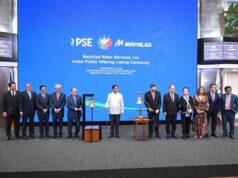By Lourdes O. Pilar, Researcher
PROPERTY DEVELOPER Ayala Land, Inc. (ALI) became the eighth most active issue last week after it disclosed plans for more bond issuances to bolster its balance sheet, which coincided with an upbeat quarterly central bank home prices index report.
A total of 24.39 million ALI shares worth P730.28 million were traded from Sept. 28 to Oct. 2, data from the Philippine Stock Exchange (PSE) showed.
ALI finished at P30.70 apiece last Friday, up by 1.5% from its Sept. 25 close. Shares in the company have declined by 31.6% since the start of the year.
“We believe that ALI was among the most actively traded stock [last] week following the report on the growth of second-quarter nationwide residential property prices published by the BSP (Bangko Sentral ng Pilipinas) last [Sept. 25],” Wendy B. Estacio, senior equity research analyst at Philippine National Bank’s (PNB) Research Division, said in an e-mail.
According to the central bank’s latest Residential Real Estate Price Index (RREPI), residential prices in the country accelerated by 27.1% year on year in the second quarter of 2020, the highest since it started releasing the index report in the first quarter of 2016.
The RREPI is used as an indicator for assessing the real estate and credit market conditions in the country.
Aniceto K. Pangan, equity trader at Diversified Securities, Inc., said that ALI is eyeing more bond offerings to strengthen its capital structure as it will be difficult to grow amid the pandemic.
“Increasing debt at low fixed rates with longer maturity is among the step to strengthen [ALI’s] debt structure or to maintain financial stability. Investors reacted positively to the move as it stabilized the price of ALI,” Mr. Pangan said in a mobile message.
After listing its P6.25 billion five-year fixed-rate bonds at the Philippine Dealing & Exchange Corp. last Tuesday, ALI Chief Finance Officer Augusto Cesar D. Bengzon said that the company plans more bond offerings to strengthen its balance sheet, taking advantage of “remarkably resilient” local capital markets.
“In our view, this should benefit the company given the potential to reduce its financing cost. In fact, ALI has already reduced its borrowing cost from 5.2% as of end-2019 to 4.9% in the first half of 2020 as a result of recent debt refinancing. We believe ALI’s balance sheet would continue to be healthy,” Ms. Estacio said.
ALI’s revenues halved to P40.20 billion in the first six months of the year amid lower project bookings and suspended construction activity, coupled with restricted mall and hotel operations, and the closure of resorts during the lockdown period. This caused its attributable net income to decline by 70.3% to P4.52 billion in the first half.
Ms. Estacio sees signs of “positive recovery” with ALI’s product lines amid the pandemic.
“We forecast ALI’s full-year 2020 revenues to decline by 50.7% year-on-year to P82.2 billion and project net income to decline by 66% year-on-year to P11.3 billion,” added Ms. Estacio.
Mr. Pangan noted that 2020 will be a challenging year for ALI in terms of revenue and income as the first half alone showed a double-digit percentage contraction in both.
“Though we may see an improvement in the second half with the ease of restriction but still lower than last year, in the long term, we may expect a resumption of growth as it addresses its short-term contraction with the improvement in its capital structure,” said Mr. Pangan
For this week, PNB’s Ms. Estacio gave a revised net asset value-based target price of P33.90 on ALI.
For Diversified Securities’ Mr. Pangan: “Definitely we may continue to see a consolidation from immediate support of P30.30 and resistance of P 31.95 per share, but with an upward bias.”



